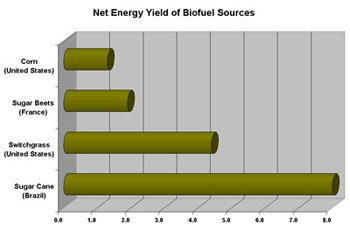U.S. House deals blow to bioenergy market
Congress deals blow to bioenergy market
mongabay.com
May 16, 2006
In a set back to the growing biofuels market and American energy consumers, House Majority Leader John Boehner said Monday he will not push legislation to reduce the U.S. tariff on ethanol imports. Thus, the United States will keep its 54-cent-a-gallon tariff on imported ethanol despite a warning from the Department of Energy that domestic ethanol supplies will fall short this summer and will need to reply on foreign fuel.
According to a report from Reuters, “House Speaker Dennis Hastert from the big ethanol-producing state of Illinois said… he did not believe there was ‘an economic plus’ in lifting the ethanol tariff ‘right now.'”
The tariff effectively makes ethanol more costly for American consumers and stifles innovation in the bioenergy market. Countries like Brazil, which can produce sugar cane-based ethanol at a fraction of the cost and energy input of corn-based ethanol, have been eager to sell to the United States where demand for such fuels is a peak levels due to high crude oil prices.

Sugar cane is about 7 times more energy efficient than corn. |
RELATED ARTICLES
High oil prices fuel bioenergy push High oil prices and growing concerns over climate change are driving investment and innovation in the biofuels sector as countries and industry increasingly look towards renewable bioenergy to replace fossil fuels. Bill Gates, the world’s richest man, has recently invested $84 million in an American ethanol company, while global energy gluttons ranging from the United States to China are setting long-term targets for the switch to such fuels potentially offering a secure domestic source of renewable energy and fewer environmental headaches.
Why are rainforests being converted for oil palm plantations? The answer lies in the crop’s unparalleled productivity. Simply put, oil palm is the most productive oil seed in the world. A single hectare of oil palm may yield 5,000 kilograms of crude oil, or nearly 6,000 liters of crude. For comparison, soybeans and corn—crops often heralded as top biofuel sources—generate only 446 and 172 liters per hectare, respectively.
Ethanol more energy-efficient than oil, finds study Using ethanol — alcohol produced from corn or other plants — instead of gasoline is more energy-efficient than oil say researchers at the University of California, Berkeley In a study published in Friday’s issue of the journal Science, Berkeley scientists show that producing ethanol from corn uses much less petroleum than producing gasoline, though they concede that there is still great uncertainty about greenhouse gas emissions and other environmental effects like soil erosion. Nevertheless the research suggests that at minimum, ethanol is a good substitute for gasoline and thus can help lessen the country’s reliance on imported oil. The study undermines critics who say that the push for ethanol is based solely on intense lobbying by the farm industry.
Biofuels can replace about 30 percent of fuel needs With world oil demand growing, supplies dwindling and the potential for weather- and conflict-related supply interruptions, other types of fuels and technologies are needed to help pick up the slack. A group of experts in science, engineering and public policy from the Georgia Institute of Technology, the Imperial College London and the Oak Ridge National Laboratory recommend a comprehensive research and policy plan aimed at increasing the practicality of using biofuels and biomaterials as a supplement to petroleum. The review article, called “The Path Forward for Biofuels and Biomaterials,” appears in the Jan. 27 issue of Science.
This article used information from Reuters.














